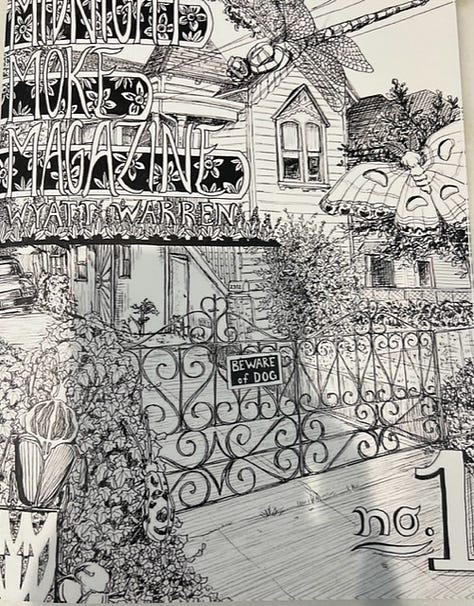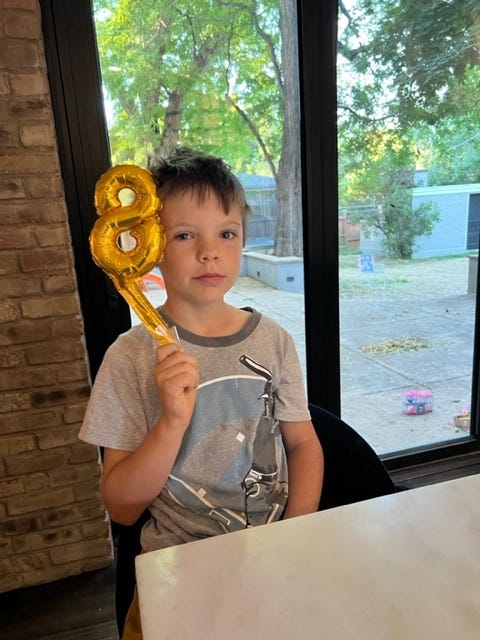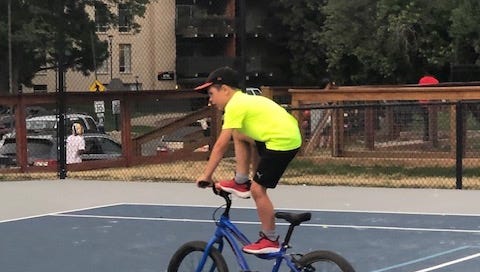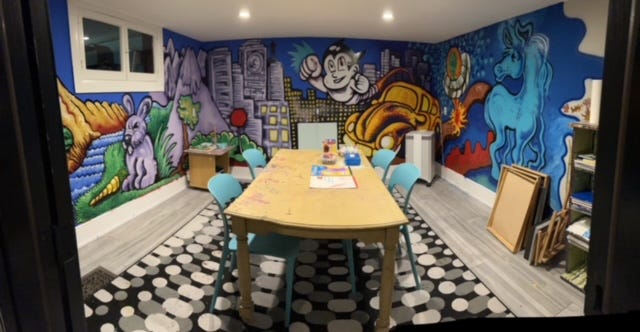Kids need the opportunity to take risks, learn from their mistakes, then succeed on their own
"Free range" parenting may be trending, but it's what I've always done. A new trend will come along, but I'll be sticking with this one. Even if Walker Bragman thinks it's bad.
I was thrilled to receive an honorable mention in Walker Bragman’s May 25 installment of his newsletter, Important Context. The self-styled intrepid leftie/man of the people investigative reporter was at it again, with another takedown of people he doesn’t like. This time he aimed his sights on Jeffrey Tucker, founder and President of the Brownstone Institute, and one of very few libertarians who didn’t cave on their supposed principles during covid.
The headline of Bragman’s piece is one of intrigue and hard-nosed reporting: Leaked Brownstone Institute Emails Reveal Support for Child Labor, Underage Smoking.
So yeah I’m in the email group. But it’s not like Bragman was on the receiving end of leaked Pentagon emails. I mean who cares about our chit chat? At any rate, there is no gotcha in what I said. I defended the idea that kids need to be exposed to some degree of risk in order to grow up with any degree of strength. Here’s what I wrote:
“Jeffrey — I like that you mention gymnastics as evidence of young people liking danger. It’s true! Sadly not so much anymore. They want safe spaces. Disagreement is violence. I wish I hadn’t broken so many bones and landed on my head so many times but at least I’m not a wimp. I can endure physical and psychic pain stoically. Ah the good old days. Next I’ll be shouting get off my lawn!”
Isn’t that the point of the latest “free range” parenting trend? Let your kids take some risks, experience a bit of (controlled) danger, so they learn and grow? Build resilience?
Free range parenting means letting your kids have the freedom to experience life without us parents hovering and guiding every move they make. It’s letting kids have the room to experience the consequences — good and bad — of their actions. And learn from that. In my mind, it’s being normal. And not thinking you can control your child’s life at every turn ensuring they never experience one unpleasant moment. It’s treating your children like human beings with some degree of autonomy and independent thought, without letting them drive the car completely off the road, so to speak.
I believe if we raise our children with the goal of making sure they experience zero unpleasantness, failure, disappointment, pain — they will not be prepared for life, which inevitably includes all of these things. A big part of parenting is equipping your kids to handle it when things get tough, because things always get tough. No matter how special and blessed you are.
I’d argue the kids raised with helicopter parents intervening at every moment are the same ones who perceive every sideways glance as a grave social injustice. Sometimes kids are mean. Don’t storm into the school and demand the teacher fix it. Teach your kid to stand up for herself and also, to avoid mean people in the future.
I’ve always been a practitioner of this thing — free range parenting — which now has a name. My parenting philosophy — if it can be called such — comes down to two things:
Give your kids the space to figure out who they are, what they like to do, what they’re good at. Without imposing your own hopes, dreams and desires on them. Give them the room to work out who they are as people. Which is usually not a mini version of you.
Make sure they know they are loved. And that you are there to help whenever they need it. As long as “help” doesn’t mean going in to argue with the teacher that they deserved an A not a C on a test they didn’t study for or getting someone to take the SAT for them so they can get into a college you find acceptable —everyone remembers the college admissions scandal, right?
Everything else, to my mind, is at the margins. Breastfeed for a year, or never. It’s a wash. Sleep train at 3 months or never? It’s a wash. Allowance or no allowance? It’s a wash.
Is your kid a little weird? So what! Guess what, you’re probably weird too. We’re all a little weird. I definitely am. If your kid is quiet, has trouble making friends, hates sports, loves math, only eats 5 foods, is just a little different — no need to rush to diagnose, therapize and medicate. Are those things sometimes necessary? Sure. But the rush to label any minute difference or quirk, then medicate it into oblivion does not respect a child’s individuality. Plus, then they have to carry a label around with them for the rest of their lives. Celebrate weird. It makes life — and people — interesting. I actually consider “weird” a compliment.
I have, and am, raising kids of two different generations. I have two Gen Z’s — ages 22 and 20. And two “alphas” — ages 8 and 6. I pretty much have parented the same way this whole time, despite the shifting trends and books telling us how we must parent now. I don’t read parenting books. Never have. (I don’t read business books either, but that’s another story.)
Generally, I never intervene at the playground if there is a little kid kerfuffle. Unless someone is hurt, let the kids sort it for themselves. (A lot of parents didn’t like this back in the early 2000s. I got a lot of dirty looks and under the breath name-calling for not breaking things up, whether my kid was the instigator or the one being instigated upon.)
If one of my children receives a grade he is unhappy with at 8 or 10 or 14, I tell them: go talk to the teacher. If you don’t want to do that, accept the grade.
One of my kids started talking really late. A bunch of doctors told me I needed to be concerned. Very very concerned. I wasn’t. I said he’ll talk when he’s ready. And he did.
When my older two were applying to college, I said: Make your list. Don’t apply anywhere you wouldn’t actually consider going. Five schools is probably enough, but it’s up to you how many you apply to. Think about XYZ (campus vs city living, big vs small, etc). If you want me to read an essay, I’m happy to but I certainly don’t need to. When you’re ready, I’ll help you pay the application fees. It was pretty drama free and they did the whole thing on their own.
It just so happens the “trend” in parenting has come around to my intuitive way of doing things. I no longer appear to be disengaged and uncaring, except according to Bragman, of course.
I couldn’t be happier that we moved to Denver where my younger kids (the “littles,” as we call them) are granted quite a bit of freedom, even at 8 and 6. Though my older boys had plenty of freedom in San Francisco as they grew up as well. All they needed was a bus pass to get wherever they wanted to go from the time they were tweens.
The younger two have a different kind of independence in Colorado. My daughter (6) is a free spirit, always clamoring for more autonomy. She has taken to riding her bike around the neighborhood on her own. It’s like 1977 up in here!
She gets home from school and all she wants to do is go out on her bike. No TV. No iPad. No parental hovering. Pure freedom. At 6.
Is it reckless of me to let her do it? I don’t know. I don’t think so. We live in a quiet neighborhood and know every neighbor within a two-block radius. Might she fall and have to figure out how to get home from two blocks away on her own? Yes. Will that be ok? Yes.
The friends she rides around with are a couple of 10-year-old boys. When they aren’t available, and she’s on her own, she visits various neighbors. One is an 80-year-old former kindergarten teacher who keeps a vat of worms for his garden. She loves the worms. Another is a 78-year-old former physician who has a room full of toys that his now grown grandchildren used to play with. He also builds large scale model planes in his garage and she likes to check out his progress. Another is a girl her age and they do regular 6-year-old things — art projects, scooting in the driveway, etc.
All of the folks she visits know me and my husband, have our cell numbers and text us when she’s there. I tell them they can always tell her she can’t come in — no playing right now — and they do just that sometimes. And she accepts it and moves on to the next friend hoping for some new adventure.
She revels in the independence. And I revel in being able to let her have it. She knows to check in every so often. She doesn’t have a watch and can’t really tell time so her estimation of check back in every half hour can be kind of off. But she knows if she doesn’t she probably won’t get to go out again for a while. Which seems to be incentive enough to play by the rules. Mostly.
Am I doing it right? Who knows. The oldest two seem to have come out pretty well. Happy, creative, kind, well-adjusted, independent, competent and hard-working. And seemingly able to handle set-backs and disappointment and keep trying.
Here’s a mural my oldest painted in our house.
Here’s the most recent art work from my 20-year-old — his latest ‘zine.



I can’t paint or draw or do anything of the like. They both showed an aptitude and love for it from a very young age; they put the hours in and got into a public high school for the arts in San Francisco. Now the oldest is in an MFA graduate program and the 20-year-old starts art school this fall.
There is certainly still time for me to screw up the little ones. But as a close friend always says to me: we screw up our kids just by being ourselves. My own peccadilloes and weirdnesses are going to creep into any relationship and there’s not a ton I can do about that.
So I’m sticking with: give them space to become who they are and love them. Let them fail. Hug them when they do fail or fall and encourage them to get back up and keep trying. But let them cry and feel sad and then realize it isn’t the end of the world when that happens. Because things get better when you get up and try again.
When the next parenting trend comes along, I’m sticking with this approach. It’s worked so far.
Bragman may feel he revealed my true colors as some sort of monster parent who believes in exposing children to life-threatening danger. I suppose his point was that my open schools advocacy was a reckless and uncaring manifestation of this heretical, evil parenting style. But I stand by it.
Let your kids take some risks, enjoy some independence and build some character.
Wish me luck with these two. I’ve got to get back to shouting at the neighborhood kids to get off my lawn while ignoring my own as they go out seeking danger.










Well it happened. Yesterday my daughter was out for 5 minutes on her bike and came home crying. It was raining and there was mud and she skidded and fell. Skinned knee. Bleeding. Cleaned it, put on a bandage and she insisted on going straight back out. She was fine.
A basic question that needs answering. What happens to the children who have been bubble wrapped? Perhaps there are University Sociology Departments out there ready to study this question.
As an employer, my observation is that their parents did them no favors. By protecting them, they stifled them, and failed to give them the skills they need to survive. Life is full of risk, and managing risk is a primary skill needed in life. That play ground with a rusty nail taught me important lessons in life, as in how to play, while not getting caught on the rusty nail. It also taught me to go get a hammer, and fix the nail. Both important skills.